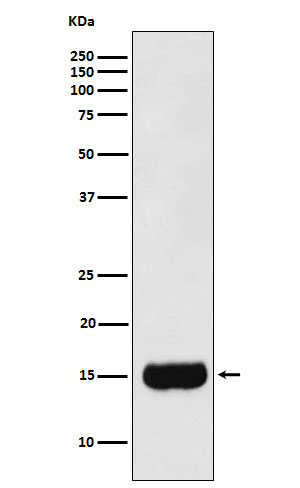
| WB | 1/1000-1/2000 | Human,Mouse,Rat |
| IF | 1/20-1/50 | Human,Mouse,Rat |
| IHC | 1/100-1/200 | Human,Mouse,Rat |
| ICC | 技术咨询 | Human,Mouse,Rat |
| FCM | 咨询技术 | Human,Mouse,Rat |
| Elisa | 咨询技术 | Human,Mouse,Rat |
| Aliases | MSP; PSP; IGBF; MSPB; PN44; PRPS; HPC13; PSP57; PSP94; PSP-94;;beta 2 Microseminoprotein |
| WB Predicted band size | Calculated MW: 13 kDa ; Observed MW: 15 kDa |
| Host/Isotype | Rabbit IgG |
| Antibody Type | Primary antibody |
| Storage | Store at 4°C short term. Aliquot and store at -20°C long term. Avoid freeze/thaw cycles. |
| Species Reactivity | Human |
| Immunogen | A synthesized peptide derived from human beta 2 Microseminoprotein |
| Formulation | Purified antibody in PBS with 0.05% sodium azide,0.05% BSA and 50% glycerol. |
+ +
以下是关于MSMB抗体的3篇参考文献的简要总结(基于公开研究整理):
---
1. **文献名称**:*Development of a Novel Monoclonal Antibody Against MSMB for Prostate Cancer Diagnosis*
**作者**:Sardana G, et al.
**摘要**:本研究报道了一种针对MSMB蛋白的新型单克隆抗体的开发,通过免疫印迹和免疫组化验证其在人前列腺组织中的特异性。结果显示该抗体能有效区分前列腺癌与良性组织,提示其在前列腺癌诊断中的潜在应用。
2. **文献名称**:*MSMB as a Biomarker in Prostate Cancer: Immunohistochemical Analysis Using Tissue Microarrays*
**作者**:Bjartell A, et al.
**摘要**:通过组织微阵列技术结合MSMB抗体检测,发现MSMB在前列腺癌中的表达显著低于正常组织,且与肿瘤侵袭性呈负相关。研究支持MSMB作为前列腺癌预后标志物的可能性。
3. **文献名称**:*Quantitative Detection of MSMB in Urine Using Antibody-based Assays for Non-invasive Cancer Screening*
**作者**:Drabovich AP, et al.
**摘要**:开发了一种基于MSMB抗体的ELISA检测方法,用于定量尿液中的MSMB水平。研究发现,前列腺癌患者的尿液中MSMB浓度明显降低,为无创筛查提供了新策略。
---
如需具体文献来源或更详细内容,建议在PubMed或Web of Science中搜索上述关键词,或提供更多背景信息以便进一步筛选。
**Background of MSMB Antibody**
The MSMB (β-microseminoprotein) antibody targets a protein encoded by the *MSMB* gene, primarily expressed in prostate epithelial cells and secreted into seminal plasma. MSMB belongs to the immunoglobulin-binding factor family and is involved in diverse biological processes, including sperm maturation, antimicrobial activity, and regulation of apoptosis. Its expression is regulated by androgens and other hormones, making it relevant in prostate physiology and pathology.
MSMB has gained attention due to its potential role as a biomarker in prostate cancer. Studies suggest that reduced MSMB expression correlates with prostate cancer progression, while genetic variants in the *MSMB* locus are linked to increased cancer risk. Antibodies against MSMB are thus valuable tools for detecting protein levels in tissues or bodily fluids, aiding in research and diagnostic applications.
In research, MSMB antibodies are used in techniques like immunohistochemistry, Western blotting, and ELISA to study protein localization, expression patterns, and interactions. Clinically, they hold promise for developing non-invasive diagnostic assays (e.g., urine tests) or targeted therapies. Despite progress, further validation is needed to fully harness MSMB's diagnostic and therapeutic potential in prostate-related diseases.
×